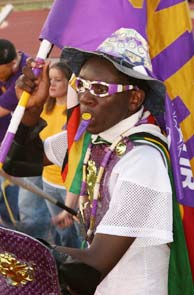New Jersey court leaves gay marriage terminology to legislature
Posted: 10/30/06
New Jersey court leaves gay
marriage terminology to legislature
By Robert Marus
Associated Baptist Press
TRENTON, N.J. (ABP)—The New Jersey Supreme Court ruled the state’s constitution requires that marriage rights be available to same-sex couples on an equal basis with heterosexuals. But the court left state legislators to decide whether to refer to the unions by the name “marriage” or a different term.
The decision leaves New Jersey in a situation akin to Vermont’s, where legislators in 2000 passed the nation’s first law legalizing “civil unions” for same-sex couples. Vermont’s civil unions, which followed a similar court decision, offer the same rights and benefits as marriage without using the name.
All seven justices agreed the New Jersey Constitution requires the state to extend to gay couples the same rights as married couples. However, only three justices said those rights include equal use of the term “marriage,” while the four-justice majority said use of the term is not guaranteed.
“The state has not articulated any legitimate public need for depriving same-sex couples of the host of benefits and privileges” that married couples enjoy, wrote Justice Barry Albin, who authored the majority’s opinion.
“There is no rational basis for, on the one hand, giving gays and lesbians full civil rights in their status as individuals and, on the other, giving them an incomplete set of rights when they follow the inclination of their sexual orientation and enter into committed same-sex relationships.”
Vermont and Connecticut have civil-union laws that provide identical benefits to same-sex couples as married heterosexual couples. Massachusetts, following a decision by its highest court, legalized same-sex marriage in 2004.
New Jersey already has a domestic-partnership law that grants to same-sex couples some of the rights and responsibilities of married heterosexuals. However, Albin noted that the statute does not provide gay couples or their children with equal protection of the law in several critical areas, such as adoption rights.
In the latest decision, Lewis v. Harris, the New Jersey court unanimously agreed that the state constitution’s equal-protection provision, coupled with the fact that other state laws ban discrimination on the basis of sexual orientation, requires a remedy for such disparate treatment of same-sex couples.
The majority determined that such a decision “leaves the legislature with two apparent options. The legislature could simply amend the marriage statutes to include same-sex couples, or it could create a separate statutory structure, such as a civil union, as Connecticut and Vermont have done.”
That result would fall short for the plaintiffs—seven same-sex New Jersey couples—and most of the nation’s gay-rights organizations. They have argued that granting marriage rights without the term marriage creates a “separate-but-equal” structure.
Albin addressed that argument. “Raised here is the perplexing question—‘What’s in a name?’—and is a name itself of constitutional magnitude after the state is required to provide full statutory rights and benefits to same-sex couples?” he asked. “We are mindful that in the cultural clash over same-sex marriage, the word ‘marriage’ itself—independent of the rights and benefits of marriage—has an evocative and important meaning to both parties.”
But Albin said the legitimacy that the term “marriage” would bestow on gay couples would best be delivered through legislative, rather than judicial, action.
“The great engine for social change in this country has always been the democratic process,” he wrote. “Although courts can ensure equal treatment, they cannot guarantee social acceptance, which must come through the evolving ethos of a maturing society. Plaintiffs’ quest does not end here. Their next appeal must be to their fellow citizens whose voices are heard through their popularly elected representatives.”
But Chief Justice Deborah Poritz, in an opinion joined by her two fellow dissenters, said the term “marriage” is as integral to the rationale cited by the majority as marriage’s attendant rights and benefits.
“Labels are used to perpetuate prejudice about differences that, in this case, are embedded in the law. By excluding same-sex couples from civil marriage, the state declares that it is legitimate to differentiate between their commitments and the commitments of heterosexual couples,” she wrote.
“Ultimately, the message is that what same-sex couples have is not as important or as significant as ‘real’ marriage, that such lesser relationships cannot have the name of marriage.”
The ruling is the first major legal victory for homosexual-rights groups since the Massachusetts decision. The highest courts in two other states—New York and Washington—both recently rejected similar lawsuits filed by same-sex couples.
Several state laws and constitutional amendments banning same-sex marriage have passed by wide margins since 1998, but poll numbers since then have indicated a general trend toward wider acceptance of gay marriage.
Eight states have proposals banning gay marriage before voters in the Nov. 7 elections. One prominent gay-rights opponent said the New Jersey decision should create a backlash that will boost the chances of those same-sex marriage bans passing.
“Today’s decision should give momentum to the eight states with marriage-protection amendments on the November ballot,” said Tony Perkins, president of the Washington-based Family Research Council, in a statement released shortly after the New Jersey ruling. “By mandating that the New Jersey legislature enact same-sex ‘marriage’ or civil unions, the court ignores the unique benefits of marriage between one man and one woman. Society gives benefits to marriage because marriage gives benefits to society.”

